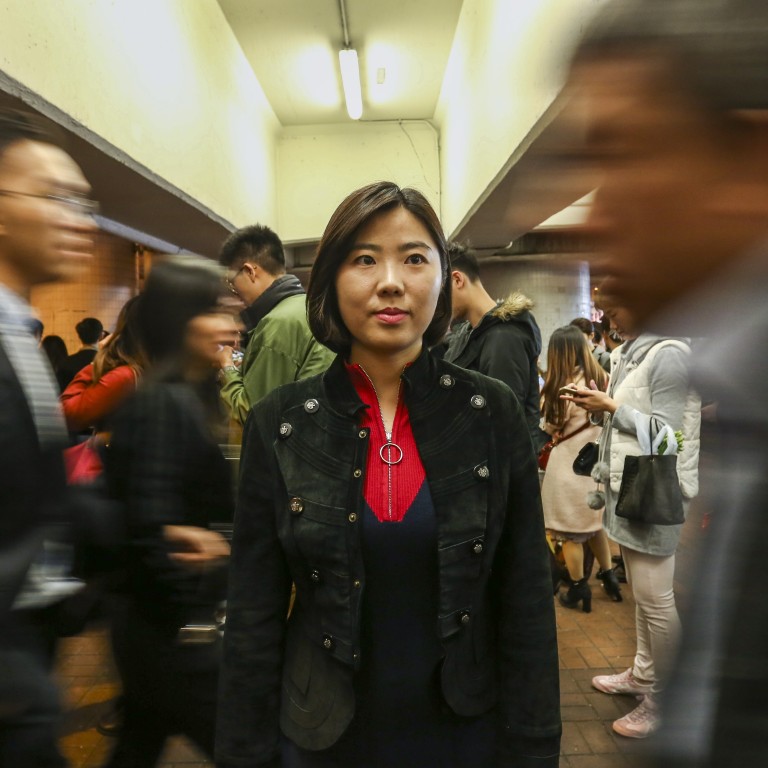
To mainland Chinese ‘Hong Kong drifters’, the allure of becoming a permanent resident in the city is fading
- Many northern migrants in the 20th century aspired to set up a life in the safe and prosperous enclave
- But in the 21st, changes on both sides of the border mean some are less keen to put down roots
Jia Jia is back in her hometown of Zhuji, Zhejiang province, for week-long Lunar New Year celebrations. She may not be able to help much with preparations — the traditional art of making savoury egg rolls is lost on her — but she has been looking forward to the firecrackers at her grandmother’s countryside home.
“It’s the most important time of the year,” says the 29-year-old, who wanted to be identified by her nickname.
Jia Jia works at a recruitment firm in Hong Kong and flies home once every two to three months. She moved to the city to pursue further studies in social work at Chinese University, believing the city offered better training and career prospects.
Having lived in the city for almost seven years, she will soon be eligible to apply for permanent residency. But she is hesitant.
“Hong Kong has never felt like home to me,” she says. “And being a Hongkonger isn’t a big deal to me.”
Poverty-stricken Chinese migrants who came to Hong Kong in the 20th century felt differently. As they peered through the dust of the Chinese civil war and the Cultural Revolution, the city – then a British colony – promised stability, prosperity and hope.
But the latest government data suggests the city might be losing its appeal. Hong Kong has just seen the biggest drop in a decade in the number of mainlanders entering with a one-way permit.
Only 41,000 mainlanders moved to the city in 2017-18, a drop of 14,700 from the previous year. In 2005-06, close to 60,000 mainlanders moved to Hong Kong.
On the mainland, the lines between business and personal relations are blurred. But in Hong Kong, business is business
The one-way permit scheme allows up to 150 mainlanders to move to Hong Kong each day, and is meant to help spouses and children born across the border reunite with their families in the city. Last year, the government predicted there would be fewer mainlanders coming to Hong Kong via the scheme, with the number dropping from an average of 128 per day to 100 from mid-2026 onwards.
Today many mainlanders who live in Hong Kong are, like Jia Jia, not long-term migrants. They are so-called Hong Kong drifters: young, educated people who leave the mainland to study or work in the city, but do not necessarily assimilate into the local culture. According to the 2016 Population Bycensus, there are about 77,000 Chinese nationals who have been living in Hong Kong for less than seven years and are not domiciled in the city.
But even to these “drifters”, the city could be losing its allure due to lacklustre opportunities, cultural differences, high property prices and growing opportunities on the mainland.
Dr Isabella Ng Fung-sheung, assistant professor at the Education University of Hong Kong, says mainlanders in the city may have fewer incentives to stay than those who came 20 or 30 years ago, when China was still developing.
“Living standards in China today are improving and moving in Hong Kong’s direction,” she says. “With infrastructure like high-speed rail, mainland China and Hong Kong are easier to travel between. Being in Hong Kong just doesn’t matter as much any more.”
And Paul Yip Siu-fai, chair professor of population health at the University of Hong Kong (HKU), who has observed a growing number of undergraduate and postgraduate students from the mainland at the university, says he has noticed more graduates returning to the mainland for work.
Technology entrepreneur Kang (not his real name) left Beijing for Hong Kong four years ago, drawn by the city’s emphasis on the rule of law and a fair business environment.
“On the mainland, the lines between business and personal relations are blurred. But in Hong Kong, business is business,” says the 37-year-old.
Kang is married to a Hong Kong permanent resident from Shenzhen, Guangdong province, and is a one-way permit holder. But he considers himself a Hong Kong drifter, because he is prepared to go wherever there is an opportunity.
He worked in the technology sector at a state-owned company before moving to the city to work, first as a research assistant at HKU and later in the technology department of a property agency.
“I spent more time with my calculator than interacting with my colleagues, but I was able to prove my worth as an employee by working hard,” he says.
Being rewarded for effort is also why Jia Jia enjoys working in Hong Kong.
“I think my supervisors appreciate me for the effort I put into my work,” she says. “Although I’ve never actually worked on the mainland, it appears to be more important for people working there to please their supervisors than put effort into their work if they want to get somewhere.”
Hong Kong is very modern, international and energetic. I like that I can explore different cultures here
She also enjoys the freedom of being away from her family, and from the expectations of mainland society.
“At my age, I’d be expected to get married and have kids,” she says. “But Hong Kong is more tolerant of people with different lifestyle choices.”
Fascinated by Hong Kong’s diversity and international culture, 25-year-old Tiffany Wang Heting from Langfang, Hebei province, stayed on to work after graduating with a master’s degree in law from HKU.
“Hong Kong is very modern, international and energetic. I like that I can explore different cultures here,” she says.
Wang, who has been working in the legal department of a Chinese bank for the past year and a half, chose to study in Hong Kong because it was affordable compared with Western countries.
“It was also easier for me to find a job here after graduation than in the US, for example,” she says. “And because Hong Kong is a part of China, I feel safer here.”
Graduates like Wang can stay and work in Hong Kong with a visa issued under the government’s Immigration Arrangements for Non-local Graduates (IANG) scheme to encourage migrant graduates to stick around. Since launching in 2008, the scheme has issued more than 70,000 visas.
Jia Jia, who also holds an IANG visa, graduated with a master’s degree in social work and thought she would become a social worker. But she changed her mind after an internship at a local secondary school.
“Social workers should know their clients’ cultural and educational backgrounds,” she says. “I didn’t know anything about the secondary school leaving exams until I was placed at the school. I figured social work was best left to people who actually grew up in Hong Kong.”
She admits her decision to give up social work was also influenced by the challenges she had to overcome when she first came to Hong Kong.

“I didn’t know anyone, and everything felt so new and strange,” she says, recalling that even having a meal at Hong Kong’s casual eateries was not easy. “At cha chaan teng, we’re expected to place our orders almost immediately. But when I first got here, I took a long time studying the menu, which annoyed the servers.”
Being able to speak Cantonese can make a difference to a mainlander’s experience in the city.
Wang, for instance, says her outgoing nature and fluency in Cantonese helped her make friends, and she plays table tennis with several groups she met at local sports centres and while on the school team at HKU.
Kang, on the other hand, has found it harder to pick up the language, despite watching instructional videos on YouTube.
“I’ve tried speaking Cantonese at eateries, and the servers would tell me to speak Mandarin instead. It’s defeating,” he says.
It has affected his social networking too, and he is aware that “you need to share a common language if you want to form a deep friendship with someone”.
But that has not discouraged him from pursuing his entrepreneurial dreams in Hong Kong. Late last year, he founded a blockchain consultancy, backed by a Chinese-owned company.
Becoming a Hong Kong permanent resident may make it more convenient for me to travel abroad, but there’s nothing else I can get out of it. It’s not like I would be able to afford to buy a home here
Although Wang and Jia Jia speak Cantonese fluently and have managed to establish social networks in Hong Kong, both are considering returning to the mainland.
Wang is currently looking for opportunities to return to the mainland, where she is qualified to practice law. She believes her parents and friends might be able to help her get a job at a firm there, something that is less likely in Hong Kong, where her qualifications are not valid.
“Hong Kong has been a great place for me to get experience because it has a good legal reputation,” she says.
“But big cities like Beijing and Shanghai also provide good education, medical service and a pretty good salary. People who got their education in those cities, and have families and connections there, may not choose Hong Kong after all.”
For Jia Jia, 2019 will be the seventh year in Hong Kong, and she is struggling to decide whether to apply for right of abode in the city. If she chooses to stay, she will have to give up her place in the mainland household registration system, and that could complicate the process of returning there for work — something she would consider if the right opportunity came along.
“Becoming a Hong Kong permanent resident may make it more convenient for me to travel abroad, but there’s nothing else I can get out of it. It’s not like I would be able to afford to buy a home here,” she says.
She is already forking out a big chunk of her income for a small place, paying HK$6,000 a month to share a 600 sq ft flat in Wan Chai with two others. Her monthly income is less than HK$30,000.
Even if Jia Jia chooses to stay a while longer, she does not see Hong Kong as a place to live for the long haul.
“I see old people getting up from their seats way before the bus reaches the stop, like they’re always in a rush to go somewhere. Hong Kong is just too stressful and crowded,” she says.
Her hometown of Zhuji has more space, and – bucking a stereotype about the mainland in Hong Kong – people are becoming more civilised and well-mannered.
“Motorists stop for pedestrians now. It wasn’t like this before,” she says. “People are also becoming more vocal against bad behaviour. For example, my mother tells off taxi drivers who use their phones while driving.”
As things change both north and south of the border, she will not be the only Hong Kong drifter to heed the call of home.

